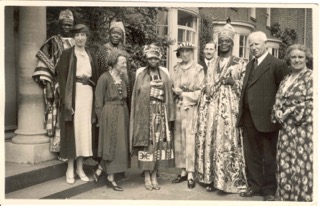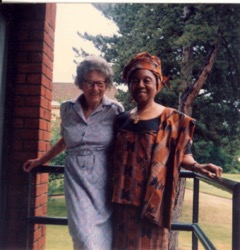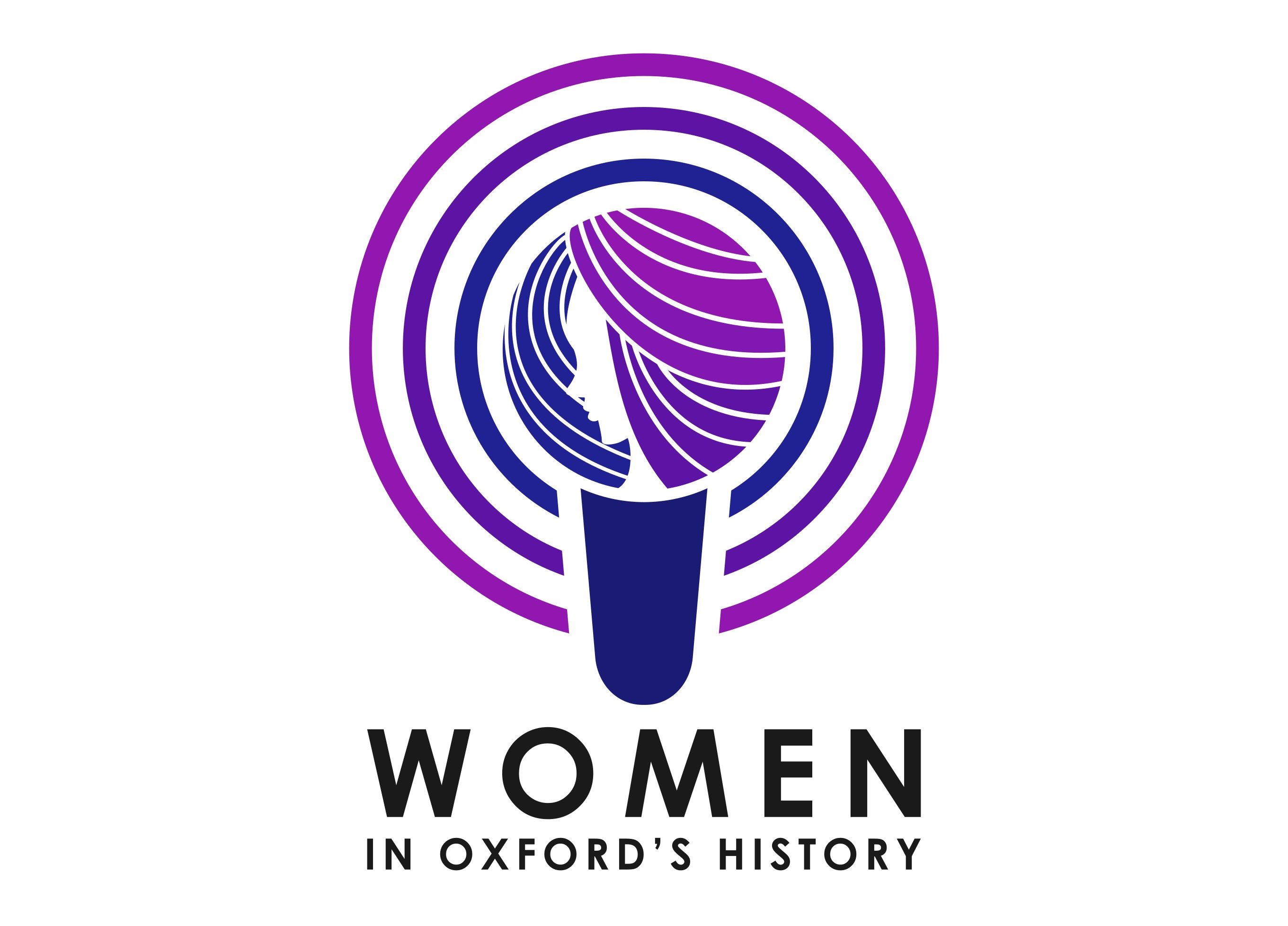
This podcast explores the life and impact of Kofoworola Ademola. She was a student at St. Hugh’s College between 1932-1935 and became the first African woman to graduate from the University of Oxford.
Kofo was born in 1913 in Lagos, Nigeria, where she spent her early childhood. Part of an elite Yoruba family, she describes her early years as being “formed in relation to Western culture”. Her great-grandfather was a minister in the Church of England and her grandfather was educated at public school in England before being ordained. Her father was taught in Bath and later studied at Middle Temple in London before returning to Nigeria as a barrister and solicitor. Her mother was also educated and attended a finishing school in England. Kofo describes feeling as if she lived between different cultures. She was brought up speaking both Yoruba and English.
In 1924, at the age of 11, she came to England for her health and education. She was a delicate child, who often suffered from malaria and was advised to go abroad to build her strength. She attended the same private girls’ school as her mother – Portway in Reading – where there was a tradition of accepting West African students. There were also many English children, whom she befriended and taught about Yoruba culture.
Between 1932 and 35 Kofo studied at St Hugh’s College, reading a combination of humanities and social sciences. She describes feeling more “homesick” and “out of place” in Oxford than anywhere else in England. It was as though she were “tossed in a sea of intellect with highly earnest students”. However, she gradually became fond of her peers’ “incessant thirst” for information, as she calls it. She suggests that she did not encounter overt racism during her time in Britain, but describes being treated as a “curio” or “weird specimen”. There were some who expressed surprise or disbelief that an African woman such as herself would be educated. A white student who was at St Hugh’s College at the same time recalls racism among the students. It is possible that Kofo screened herself from this to some extent by socialising with international peers or those more tolerant in their outlook.
She had a wide circle of friends from different cultural backgrounds and seems to have been popular with her fellow students. She describes receiving more invitations to coffee-parties in her first two terms than the other first-yeas. In time, she became an active part of Oxford’s academic and social life. She was a member of a number of student groups, including the African Society, the English Literature Club, the Anthropological Society, the Labour Club, the Geographical Society, and the Imperial Club. She attended meetings of the Indian Students’ Union and the Oxford Union. She often wore traditional Yoruba attire to functions and used her social contacts to educate others about life in Nigeria.
She recalls this as a time of fervent discussion about Nigerian politics, particularly the relationship between its people and the British Government. There was an increase in organised opposition to the colonial administration in this period. Kofo also appreciated the opportunity to learn more about political ideologies while in Oxford. She came to believe that a “scientific study” of Socialist principles was needed in Africa to help people “mitigate the dangers of the individualistic and capitalistic attitude” introduced by contact with the Western world.

Kofo passed her exams despite being forbidden by doctors to read during her final year due to what they saw as a mental fragility. Nonetheless, her tutors regarded her as having an exceptional memory and the ability to undertake large amounts of work.
After graduating from Oxford, Kofo wrote a short autobiography about her experiences there. It was published by Faber and Faber as part of a series of books aimed at enlightening the British public about the lives of colonial subjects. Here, she writes about her views on, and experiences of, cultural integration and exchange. She felt that “adjustment” was only possible if there was a “gradual process of introducing people into a foreign country and to foreign life”. She was enthusiastic about the benefits of people from different cultures mixing and expressed a wish that there could be at least two African female students in Oxford each year. She felt that inter-cultural encounters were an important way of improving cultural understanding and paving the way for more peaceable international relations.
Following her experiences in Oxford, Kofo went on to become an important educator in Nigeria. She worked at Queens College, Lagos from 1936 to 1938 and then became the co-founder and principal of New-Era Girls’ Secondary School, also in Lagos. She was committed to improving opportunities for women such as herself. In particular, she wanted to help provide African girls with the rigorous preparation the University of Oxford required, both educationally and culturally.
She also played a role in women’s organisations and with the Red Cross, for which she received a Most Excellent Order of the British Empire (MBE) in the UK and Order of the Federal Republic (OFR) in Nigeria. She married Sir Adetokunbo Adegboyega Ademola who would later become Nigeria’s first African Chief Justice and a member of the Privy Council in the UK. He enjoyed a prominent role in international affairs, which gave Kofo opportunities for world travel. She died in 2002.
Bibliography
Chance, Eleanor et al, A History of the County of Oxford, Vol. 4: The City of Oxford, ed. by Alan Crossley and C.R. Elrington (London: Victoria County History, 1979).
Fitzgerald, Mary Ann, Henry J. Drewal, and Moyo Okediji, “Transformation through Cloth: An Egungun Costume of the Yoruba”, African Arts 28.2 (1995): 54–57.
Hill, M. B., and J. E. Webb, “The Ecology of Lagos Lagoon. II. The Topography and Physical Features of Lagos Harbour and Lagos Lagoon”, Philosophical Transactions of the Royal Society of London. Series B, Biological Sciences (1934-1990) 241.683 (1958): 319–333.
Hunsu, Folashade, Zangbeto: Navigating Between the Spaces of Oral Art, Communal Security and Conflict Mediation in Badagry, Nigeria (Uppsala: Nordic Africa Institute, 2011).
Ingram, Amanda, Casual Chat Re Lady Ademola, 5 February 2016.
Miller nee Tanner, Eileen, Reminiscences of a Very Ordinary History Student 1932-1935 (1984). E-mail.
Ochonu, Moses E, Colonial Meltdown (Ohio: Ohio University Press, 2009).
Perham, Margery, Ten Africans (London: Faber and Faber, 1936).
Roberts, Pamela, Black Oxford: The Untold Stories of Oxford University’s Black Scholars (Oxford: Signal Books, 2013).
Starkie, E., Tutor’s Reports on Kofoworola Moore (St Hugh’s College, 1935).
West, Priscilla, “Reminiscences of Seven Decades”, in St Hugh’s: One Hundred Years of Women’s Education in Oxford, ed. by Penny Griffin (Oxford: Springer, 1986).
JC Niala is currently reading for an MSt in Creative Writing at the University of Oxford.
